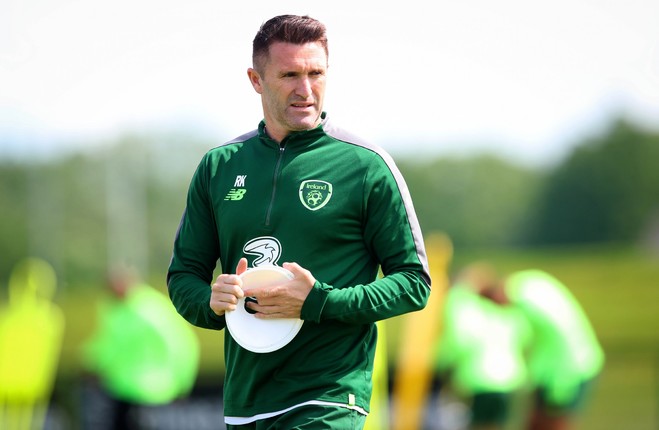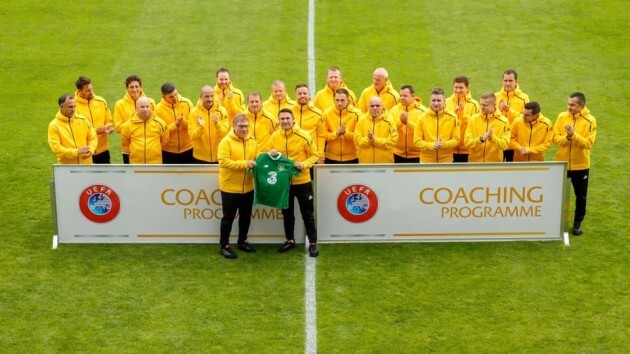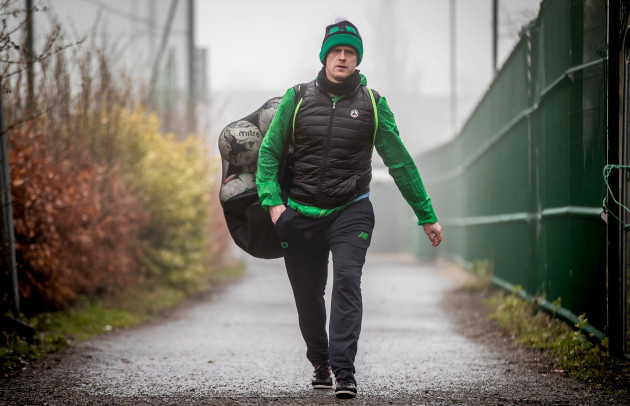A FEW YEARS AGO, Niall O’Regan was at Uefa HQ in Switzerland, busy bending Harry Kewell’s ear.
Kewell had a task: to set up a training session to prepare to face Liverpool in the Champions League.
(Yep, that’s already-won-the-Champions-League-with-Liverpool, Harry Kewell.)
O’Regan, meanwhile, was one of his assistant coaches, along with another European Cup winner in Benni McCarthy and Premier league veteran Hermann Hreidarsson.
All four were completing their Pro Licence coaching courses, and while O’Regan’s playing career could not compare with his colleagues, his coaching career did.
“I was going to bed that night thinking I’ve just told a guy who won the Champions League with Liverpool about how we should go about preparing to face his former side, and he’s soaking it up”, O’Regan tells The42.
He’s talking to us to explain what exactly happens on a Pro Licence coaching course, where illustrious playing careers don’t quite hold the same weight as they do on television.
The Pro Licence is the highest coaching badge in Europe, and a necessary qualification to manage in a top-tier domestic league along with the Champions League and Europa League.
O’Regan earned his stripes and has now gone from student to master: as the head of the FAI’s Coach Education, O’Regan arranges and oversees the course at the FAI, and helps to grade the work submitted at the end of the course.
The latest batch of candidates graduated at the end of June, with Damien Duff, Robbie Keane, Keith Andrews, Vinny Perth, Andy Reid, and Neale Fenn among the most recognisable names. (Jim McGuinness started the course but left to take up a job in the U.S., and will rejoin the next crop of coaches later in the year.)
It’s heavy work, and O’Regan says candidates sink between 600 and 700 hours’ work into the 18-month duration.
“Only 9,000 people in the world have a Pro Licence, you’re talking about an extremely elite group of people and it’s very rewarding”, says O’Regan.
The course costs €7,000 through the FAI, which is often compared unfavourably with other courses in Europe (the Spanish course is around €1,200, for example) but the FAI course includes travel, accommodation and food expenses incurred on foreign trips, which isn’t the case in Spain. O’Regan estimates the FAI spend around 90% of that fee on delivering the course itself.
Candidates meet for eight, three-day “contact blocks” across the 18 months, with lots of course work to keep them busy in the interim.
(Damien Duff’s completed file of assignments, session plans, and reflections came in at just under 800 pages. Ulysses is shorter.)
Coaches have to present a full “periodisation” plan – a roadmap of the number and types of sessions they plan to arrange for a team – along with the course’s signature test, a research assignment.
The FAI decided to give these a more practical quality, and assigned each candidate a national team that Ireland may face at the European Championships. All parts of these reports have been made available to Stephen Kenny and his management team, so they have a vast library of information about opponents to draw on whenever they like.
To give a few examples: Duff studied perennial Irish opponents Denmark, Andrews analysed England, while Keane – then a part of the Irish set-up – researched the Irish team.
The research projects are very detailed, needing about 250 hours’ work.
Candidates were asked to produce a pre-tournament report on their assigned nation, and were expected to have studied 10 previous games in granular detail, down to shape and set-up around every single restart, including throw-ins.
They had to be able to present on teams’ shape, and how they react and change in games. How do they change if they are winning 1-0? Or losing 2-0? Does the manager usually bring on a certain player in that scenario? Or does he change shape?
Candidates also had to study all of the relevant manager’s press conferences, both before and after the games.
“There are ways in which we can find underlying messages”, says O’Regan. “Is he trying to downplay an opposition? How does he speak about key players? Does he talk about ways in which he will approach a game and then act differently in the game?
“Human beings are creatures of habit and there will be tells, like a game of poker. If you analyse a manager in every press conference around 10 games, it’s amazing what you will learn in terms of what they’re getting across to their own players.”
Candidates do some media training of their own. As part of the course, a TV reporter was brought in to role-play a series of post-game interviews. There were a number of different real-world scenarios used, with each interview recorded and then reviewed.
Now comes a question rooted in this reporter’s self-interest. How are candidates supposed to handle these interviews?
“Objectivity is key. We always say the stats never lie, so look back at your stats, so if someone challenges you in terms of results or what you’re doing, try and have a reference point to hand.
Never speak about an individual player, don’t get caught up in speaking about individuals as it can create conflict, be vague about what you’re actually saying. The most important thing you want is, prior to going into any interview, knowing what you want taken away as the headline. Have that one-liner ready, so you’re giving them the one-liner they are looking for but one that is what you want it to be.
“It’s really about managing the conversation, and being comfortable.”
To illustrate that final point, O’Regan cites a visit the candidates made to Celtic, where they were invited to sit in on an interview with Scott Brown. At one point, Brown took polite umbrage at a question he was asked, and responded in a way that would make most reporters’ blood run cold and question all of the life choices that had brought them to that room.
I’m not comfortable answering that, and I’m actually disappointed you’ve asked it.”
The message, says O’Regan, is that it’s better for coaches to be forthright in rejecting questions than try and politely massage their way around an awkward answer, lest they part with something they didn’t want to say.
It was also at Celtic that O’Regan and those with him learned a keener sense of the game’s sharp edge. He was among a group of coaches from Ireland sitting with Neil Lennon after Celtic were knocked out of the Champions League by Cluj in 2019.
Celtic lost but should have won, and there they sat with Lennon in the fraught hour after a defeat as chanted variations of ‘Lennon out’ wafted through the windows from outside.
As respected and as exhaustive as the Pro Licence course is, it doesn’t fully prepare anyone for The Job.
“Nothing will ever prepare you for the manager’s job”, says O’Regan, citing the berserk stress of the gig.
“Statistically, if you don’t get to 76 games in your first job, there’s more than a 90% chance you won’t get a second job. The stress of that environment is huge.”
O’Regan says those conditions can’t be replicated, but they work with coaches to identify how they might react instinctively in certain situations.
Each candidate does a psychometric test to determine how they might naturally respond, and thus are at least aware whether their response is calmly considered.
“We can challenge them and put them in scenarios, and find out their areas of weakness and exploit them, and create those external threats.
“It’s about figuring out who you are, and then being aware that if you’re put in this situation, this is how you will likely react. So when the coaches are in that situation, they will have a reference point, ‘I have to be careful here, as this could trigger a personal emotion or something in me that will come out in a way I don’t want it to.”
There were a series of club visits along with a trip to meet a few other nations’ candidates at Uefa HQ in Nyon, where Duff put on a session while Keane and Ger O’Brien gave presentations. This year’s crop have had several guest speakers, including Netherlands Assistant Manager Dwight Lodeweges, former Leeds boss Howard Wilkinson, West Ham assistant Alan Irvine, and Stephen Kenny.
Kenny is certainly in touch with what’s happening around him: he watched all of the research project presentations and has offered feedback to O’Regan on elements of the course.
The Pro Licence course meshes with most of the international teams at the FAI, with each of the underage Irish international managers serving as mentors to candidates on the course.
O’Regan heaps praise on the FAI’s High-Performance Director Ruud Dokter, who sits on an influential coaching committee at Uefa. Dokter has faced plenty of criticism since joining the FAI – particularly in schoolboys’ circles – but O’Regan says Dokter’s standing in Europe has benefitted the FAI coaches enormously, helping in one instance to secure dressing room access for candidates at first-team games in the Dutch Eredivise.
O’Regan says the involvement of underage international coaches as coach educators along with Dokter’s reputation – he has been inducted to the Dutch Asociation’s Hall of Fame – has given the FAI’s course “huge credibility” in Europe.
The programme has been criticised in the past for not doing more for retiring Irish players eager to start coaching – Shay Given and Kevin Kilbane said they did theirs in Northern Ireland following a lack of communication from the FAI – but it seems that issue has been addressed, and they have already started talking to Seamus Coleman and Conor Hourihane about their coaching ambitions.
O’Regan has praise for all of the class of 2020, and namechecks Dave Rogers, Kevin Maher, Paddy McCarthy, and one other familiar candidate.
“In terms of sheer ability, Damien Duff. Damien came into the B Licence eight years ago with a new MacBook he had bought off the shelf and had not yet turned on. He is now more efficient than anyone I’ve ever met at creating a presentation.
“He is outstanding on a laptop and backs it up with what he puts on the pitch. His work ethic is phenomenal and he will 100% manage at the highest level.”
The class of 2020 completed their exit interviews virtually, and will gather for their graduation ceremony later this year.
The full group of graduating Pro Licence candidates for 2020 are: John Andrews, Keith Andrews, Jim Brennan, John Cotter, Damien Duff, Neale Fenn, Paul Hegarty, Robbie Keane, Paddy McCarthy, Kevin Maher, Ger O’Brien, William O’Connor, Vinny Perth, Andy Reid, Stephen Rice, Dave Rogers, Szilard Suto, Srdjan Tufegdzic.



